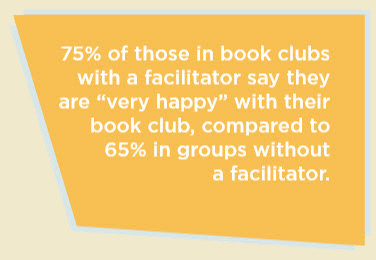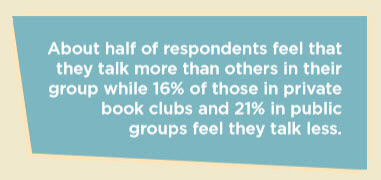As reported in our recent publication The Inner Lives of Book Clubs, the vast majority of book club members surveyed describe their group as a vital and fun aspect of their life. They report enjoying a sense of community and a deepened sense of empathy and, often, close personal friendships.
But even in the most harmonious of book clubs, conflict is likely to arise at some point, and if disagreements are not resolved, problems may grow more intense and people may end up leaving their book club - or worse - they may reach a breaking point and disband the group altogether.
 In our research we've found that one common cause of conflict are overly dominant personalities (ODPs) - people who, whether intentionally or not, occupy too much of the limelight and overpower one or more elements of the book club, such as book selection or the discussion itself.
In our research we've found that one common cause of conflict are overly dominant personalities (ODPs) - people who, whether intentionally or not, occupy too much of the limelight and overpower one or more elements of the book club, such as book selection or the discussion itself.
We have one member who is subtly dominant and sabotages book choices that are more challenging.
One member does a lot of research into books but only in the genre she likes. Because she has done so much work we often feel obligated to choose her books.
One of the original founders sees it as her book club. She talks at least twice as much as anyone else and there can be no changes to our format without her blessing. Members have quit because of this.
One of the members would just talk on about herself and her family; the rest of us couldn't get a word in. It was supposed to be a fun night out but it wasn't, so I quit.
Of the twelve common book club challenges we researched, overly dominant personalities is by far and away the most common issue experienced, with 34% of respondents in private book clubs and 39% in public groups (such as those that meet in libraries) saying they had experienced one or more ODPs in their group. Additionally, 38% of those who left a former book club due to dissatisfaction cited ODPs as one of the reasons they left. ODPs can also impact other common book club issues. For example, while 16% of all book clubs say that their group has been concerned about a member who rarely speaks, this rises to 26% in groups with an ODP.
So, what to do? How does a book club resolve the problem of an overly dominant personality most effectively?
Book clubs are as diverse as their members, so there is no single right way to resolve problems that arise. However, we have discovered that many successful book clubs have clearly-defined basic expectations and actively listen to and respect each other, and are willing to compromise. In short, discussing the issue, instead of allowing it to fester and intensify, is a good starting point!
But how, specifically, have book clubs handled the problem of overly dominant personalities?
Let's take a look:
 Designate a discussion facilitator:
Designate a discussion facilitator:
75% of private book clubs and 93% of public groups have somebody facilitate their discussions (sometimes the same person each time, sometimes the role is rotated).The facilitator has the authority to bring the discussion back on track without being seen as "bossy." It is interesting to note that 75% of those in book clubs with a facilitator say they are "very happy" with their book club, compared to 65% in groups without a facilitator.
A good facilitator can handle the overly dominant member by asking for another's comments.
As the facilitator, I carefully rein in the dominating ones while still allowing them to jump in. It is done delicately and sometimes with a bit of humor.
Establish clear ground rules:
Successful groups that do not have a facilitator tend to be those that have clearly established and well-communicated expectations and have members who feel comfortable speaking up to (respectfully) redirect other members if needed. Agreeing on the core objectives of the group will help prevent problems from happening, and make resolving them easier when they do.
Setting ground rules before the group begins talking helps discourage dominant speakers.
We have one member that makes a habit of derailing the discussion. Everyone in our group (except the culprit) seems to recognize this and, as a group, we gently but firmly steer the conversation back to the book. It can be taxing at times.
Set time limits:
Some groups limit the amount of time each person has to express their opinions, sometimes using a physical prop as a reminder.
We ring a bell when someone goes on and on!
We give each person five note cards. A person has to throw a card into the hat each time she speaks.
 Communicate the problem to the offending party:
Communicate the problem to the offending party:
Sometimes the overly dominant personality is unaware that they are causing an issue for the group as a whole, so a private conversation with the individual can help.
People have spoken to her privately in a very respectful manner.
I spoke to her privately about the problem and it was fixed.
To expand on this point, a person can recognize that they talk more than others in their group, without realizing that it is an issue. For example, when we asked 2,700 people whether they felt they talked more or less than others in their book club, 14% in private groups and 20% in public book clubs reckoned that they talked much more than others (ranking themselves 6 or 7 on a 7-point scale). It's unlikely that every single one of these respondents is considered to be an ODP by their group, but the chances are that a fair number are.
Ask them to leave, or disband:
If all else fails, sometimes the member will be asked to leave, or will leave of their own accord; other times the group disbands (and may reform shortly after without the ODP).
We let the member go but we all felt bad.
We disbanded the book club and then restarted another club.
Overly dominant personalities are one of the twelve common book club challenges we researched in The Inner Lives of Book Clubs. We will explore others in future posts.
Has your book club experienced this problem? If so, how did your group deal with it? Please do share below!
 The findings in this article are drawn from our published research: The Inner Lives of Book Clubs and/or Book Clubs in Lockdown. More about both at bookbrowse.com/wp.
The findings in this article are drawn from our published research: The Inner Lives of Book Clubs and/or Book Clubs in Lockdown. More about both at bookbrowse.com/wp.
You can see more articles in The Inner Lives of Book Clubs section of this blog; and receive future articles in your mailbox by subscribing to our newsletters, in particular Book Club News or Librarian News.
And if you're looking for an expert on book clubs for interview, please contact us!